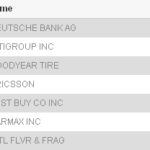Creating a CV that stands out and immediately catches the reader’s attention is a difficult task. It is the first thing employers look at when you apply for a job in accounting and if it isn’t any good, it will also be the last.
So you need to take into consideration these tips to make sure your CV isn’t tossed into the bin with the day’s junk mail.
1)     Keep it short. Don’t let your CV run onto more than two pages. Employers receive lots of CV’s so if you can impress and get to the point in two pages rather than over the course of four or five they are much more likely to prefer you.
2)     Keep it formal. Write in the third person – avoiding the use of “Iâ€.
3)     Make it specific. Don’t just write one CV and then distribute that CV to every employer you then apply to. Employers aren’t stupid and will easily recognise blanket distribution. Tailor your CV to the necessary needs for the role you are applying for.
Research the company you are applying to – make sure you include all the that the specific job advert outlines are need.
4)     Sell yourself, but be truthful. Demonstrate what you can bring to the company and the skills you possess which would benefit them. Don’t just make it up though and include what you think the employer will want to hear.
You are very likely to be asked questions on your CV if you get to an interview, so if you cannot back up what you have written you’ll only make yourself look a fool. Include the most important information towards the top in the first two or three paragraphs. If you have previously freelanced for a similar company in the same industry, say it straightaway.
5)Â Â Â Â Â Include facts and examples. When demonstrating your skills, there is no better proof then to show how your skills have helped you in previous experiences or results you have achieved because of your capabilities.
6)Â Â Â Â Â Highlight. Select key words and skills within your CV and make them a bold font or a different colour to the rest of your text in order to make them eye catching to the reader.
7)Â Â Â Â Â Personality. Show your personality rather just your skills and academic results. Tell them about your hobbies and past times away from the working environment. Employers will appreciate knowing more about you and your lifestyle too.
8)     Chronological order. When starting to list your academic qualifications, start with your most recent first. So if that is a University degree don’t put your high school GCSE level results first.
9)Â Â Â Â Â Cover letter. Always include a cover letter with your CV. No more than a single side of A4 should do the trick. Here you should highlight two or three main points from your CV which you feel make you ideal for the role you are applying for and talk about these in detail.
10)Â Â Last of all. Check it!! Proof read your CV over and over. It would be unprofessional and silly to have startling errors evident in your CV. Check your spelling and grammar. Even the simplest of words may contain a typo, so if you proof read it once and think its fine, go back and check again.
You wouldn’t turn up to your interview with a scruffy shirt on so why turn up with a scruffy CV?
Follow these ten tips for a great freelance CV. However if you’re feeling a little more creative and want to stand out from the crowd why not think outside the box on how you could deliver your CV.
Here’s a few of examples of some rather innovative CV’s:
- This integration of QR code technology and the YouTube video by Victor Petit is quite amazing.
- Gareth Cash wrote a cover letter like I’ve never seen before…
- …and if you can sing then why not give this a go.
This article was written by Jonny Bridge on behalf of accountancy company Nixon Williams. For more information visit the site today.










{ 0 comments… add one now }